Introduction
Crossing the age of 30 is a major milestone. Life becomes busier, responsibilities increase, and health slowly shifts in silent ways. Many Indians ignore early symptoms, assuming they are due to stress, workload, or lack of rest. But after 30, your body begins showing warning signs related to heart health, mental health, metabolism, hormones, bones, and immunity.
A general physician (GP) becomes extremely important at this stage. They help detect lifestyle diseases early, guide regular checkups, and prevent long-term complications.
Ignoring symptoms after 30 can lead to diabetes, hypertension, depression, heart attacks, infertility, chronic pain, and more.
This guide covers the 10 health problems you should never ignore after 30, why they happen, how to identify them, and what a GP recommends for early management.
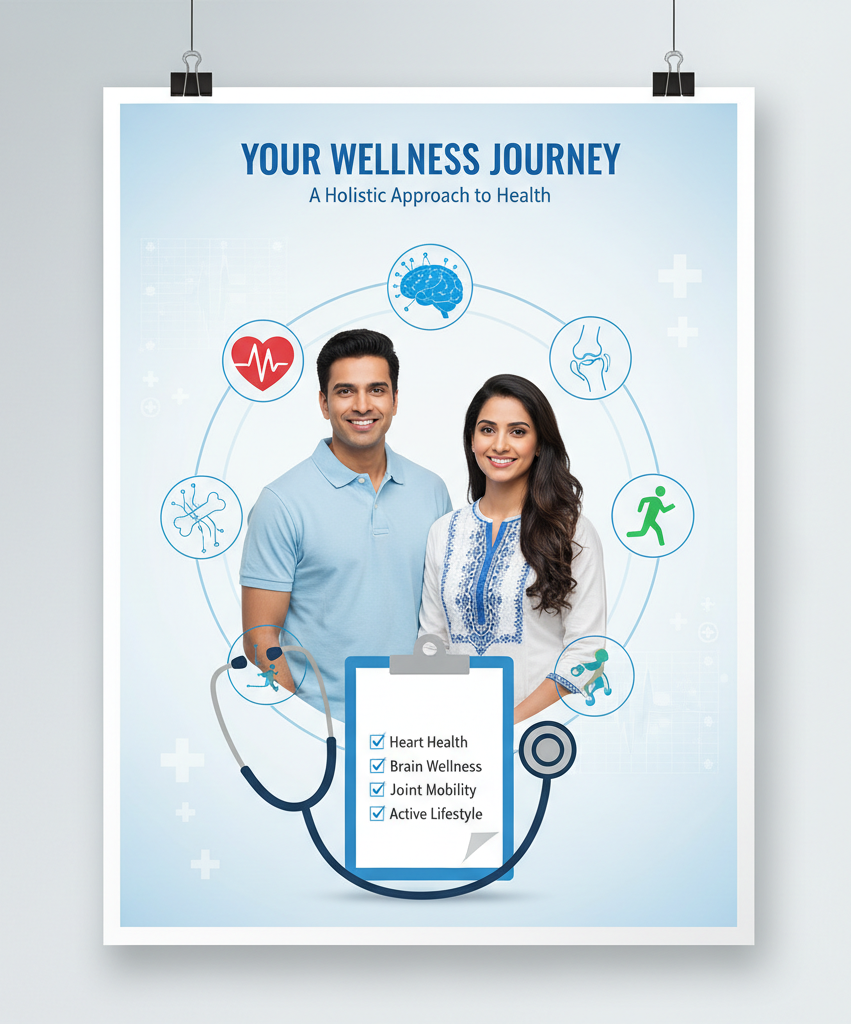
10 Health Problems You Should Never Ignore After 30
1. High Blood Pressure (Hypertension)
Overview
Hypertension is rising sharply in India due to stress, lack of sleep, high-salt diets, and sedentary lifestyles. Many people discover it only after a complication.
Symptoms
- Headaches
- Chest heaviness
- Irritability
- Fatigue
- Dizziness
Why It Matters
Uncontrolled BP can silently damage your heart, kidneys, and brain.
Diagnosis
Regular BP checks with a general physician.
Treatment
Diet changes, exercise, weight control, and medicines if prescribed.
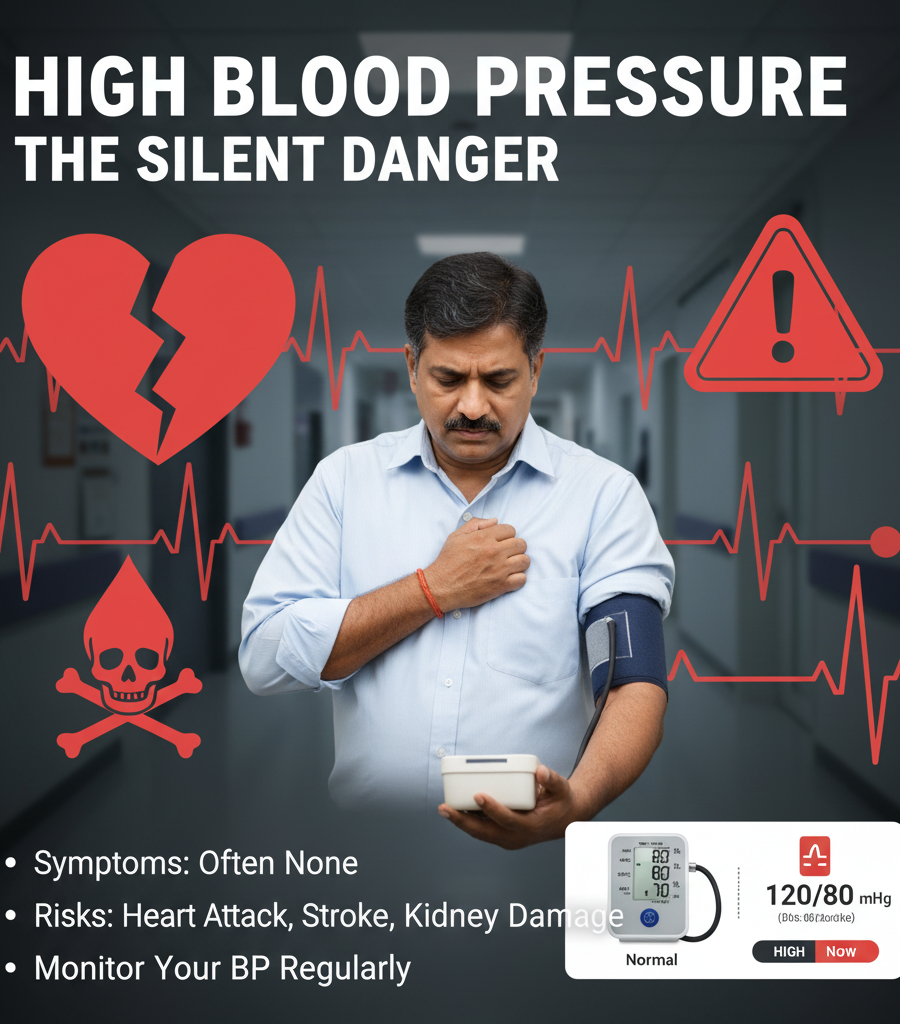
2. Prediabetes and Diabetes
Symptoms
- Frequent urination
- Increased thirst
- Sudden tiredness
- Slow wound healing
Risks
Diabetes after 30 is extremely common, especially among Indians with a family history.
Management
Blood sugar tests every 6–12 months, early lifestyle changes, and diabetic screening.
READ ALSO: World Diabetes Day 2025: Surviving Winter With Diabetes; Expert Tips For Better Control
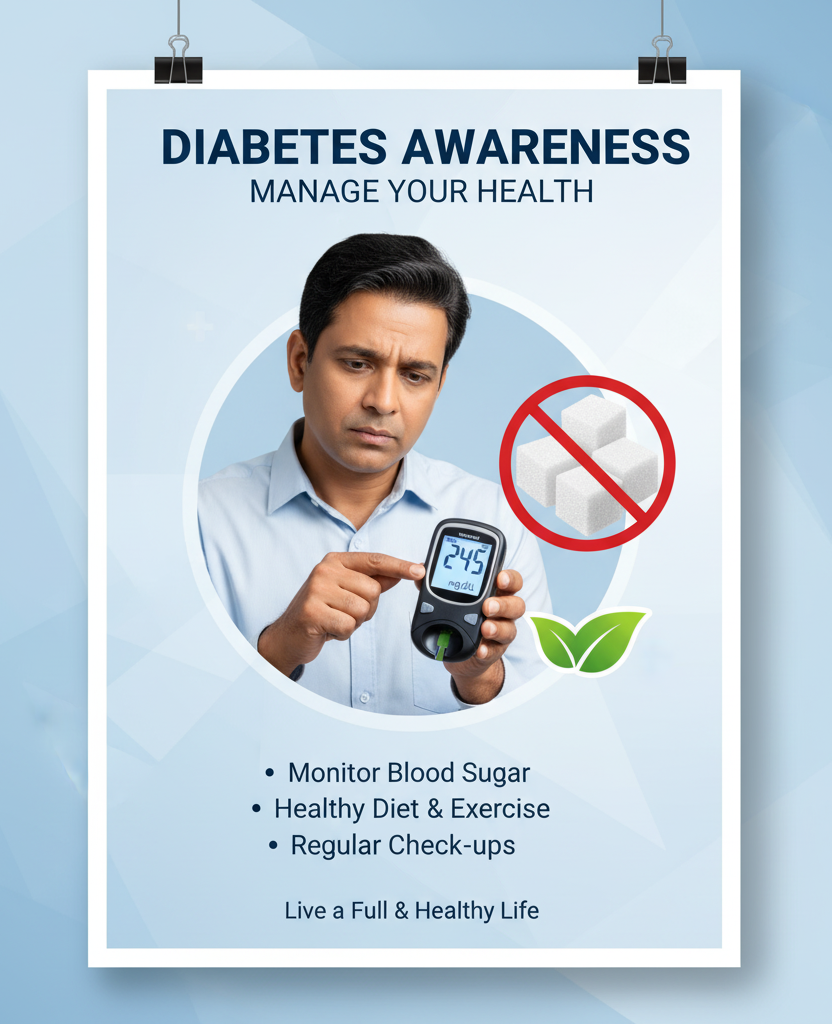
3. Thyroid Disorders
Common After 30
Women are especially at risk.
Symptoms
- Weight gain or loss
- Hair fall
- Mood swings
- Menstrual irregularities
- Weakness
Treatment
Thyroid profile testing + medication as per doctor’s advice.
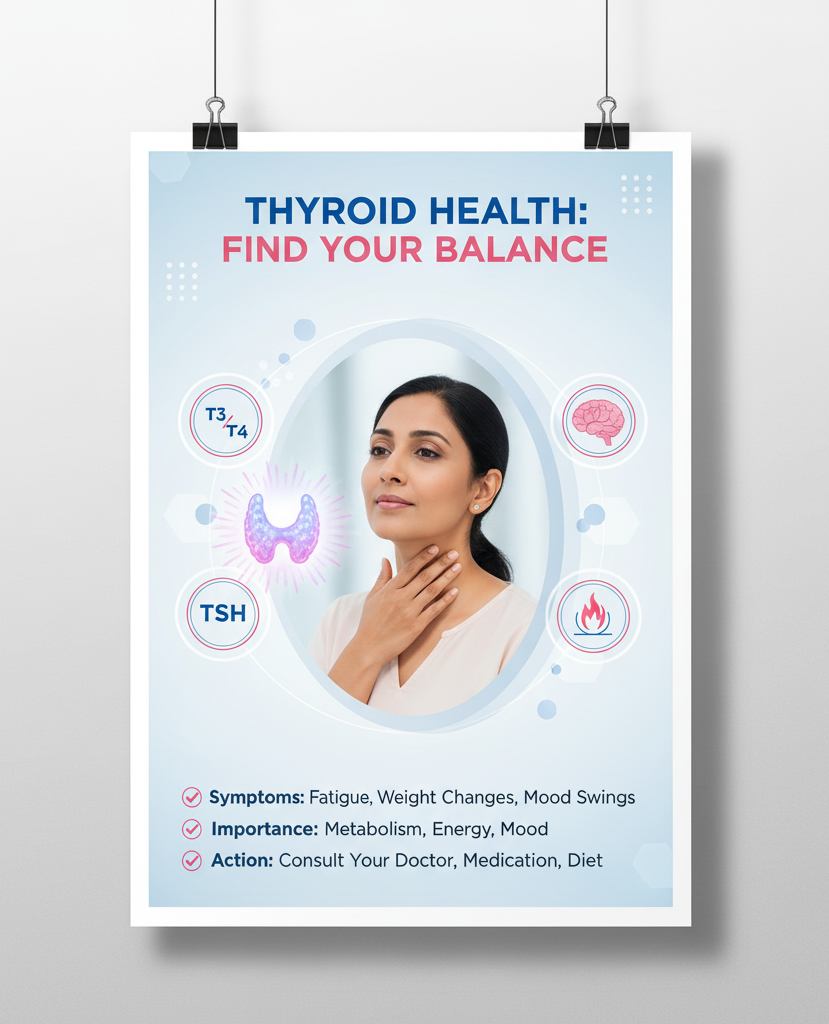
4. Vitamin D & B12 Deficiency
Desk jobs, lack of sunlight, and poor diets make deficiencies very common.
Symptoms
- Fatigue
- Muscle cramps
- Tingling
- Low mood
Prevention
Balanced diet, supplements (only if advised), sunlight exposure.
5. High Cholesterol
Often symptomless but dangerous.
Risks
Can cause heart attacks even in the early 30s.
Diagnosis
Lipid profile every year.
What Helps
Low-oil cooking, avoiding fried food, regular exercise.
6. Chronic Fatigue & Low Energy Levels
Fatigue after 30 is not “normal”.
It may indicate anemia, thyroid issues, burnout, or mental health concerns.
When to See a GP
If tiredness persists despite rest.
7. Mental Health Problems (Anxiety, Depression, Burnout) — Most Ignored After 30
Doctors warn this is one of the biggest silent health concerns today.
Why It Spikes After 30
- Work pressure
- Family responsibilities
- Financial stress
- Parenting
- Hormonal changes
Symptoms
- Constant worry
- Irritability
- Sleep problems
- Loss of interest
- Overthinking
- Appetite changes
Why Ignoring It Is Dangerous
Mental health affects heart health, immunity, digestion, relationships, and productivity.
What Helps
Talking to a GP or mental health specialist, therapy, routine changes, mindfulness, and reducing screen time.
8. Joint Pain & Early Arthritis
Causes
- Sitting too long
- Lack of exercise
- Weight gain
- Old injuries
Symptoms
- Knee pain
- Stiffness
- Back pain
- Neck strain
Management
Physiotherapy, posture correction, strengthening exercises.
9. Stomach Problems (Acidity, IBS, Fatty Liver)
Due to spicy food, stress, irregular meals, and poor sleep.
Symptoms
- Bloating
- Gas
- Stomach discomfort
- Acidity
- Constipation
Why It Matters
Fatty liver is now seen in people as young as 28–35 in India.
10. Heart Problems (Chest Pain, Palpitations)
Heart attacks in young adults are increasing at an alarming rate in India.
Symptoms You Should NEVER Ignore
- Chest pain
- Jaw/arm pain
- Shortness of breath
- Sweating
- Palpitations
Immediate step
Visit a general physician or emergency care immediately.
Causes: Why Health Problems Increase After 30
- Stress and work pressure
- Poor diet
- Sedentary lifestyle
- Lack of regular checkups
- Hormonal changes
- Sleep deprivation
- Increased responsibilities
- Genetic tendencies
Diagnosis: Tests You Must Do Yearly After 30
A general physician will usually advise:
- Complete Blood Count (CBC)
- Thyroid profile
- Fasting blood sugar & HbA1c
- Lipid profile
- Liver & kidney function tests
- Vitamin D & B12
- ECG
- Urine tests
Treatment & Management
- Early diagnosis
- Lifestyle modifications
- Stress management
- Medicines (only if doctor recommends)
- Physiotherapy
- Mental health counselling
- Regular checkups
Lifestyle Tips for Better Health After 30
- Sleep 7–8 hours
- 30–45 minutes of exercise
- Limit sugar & salt
- Eat home-cooked meals
- Stay hydrated
- Practice yoga or meditation
- Reduce screen time
- Avoid smoking & excessive alcohol
Prevention: What Doctors Recommend
- Annual health checkup
- Routine assessment with a GP
- Balanced diet
- Weight control
- Mental health awareness
- Adequate physical activity
When to See a General Physician
Seek immediate medical help if you notice:
- Persistent fatigue
- Chest pain
- Irregular heartbeat
- Sudden mood changes
- Unexplained weight changes
- Chronic pain
- Sleep disturbances
- Digestive issues
Risks & Complications If Ignored
If left untreated, these conditions can lead to:
- Heart attack
- Stroke
- Kidney damage
- Infertility
- Severe depression
- Liver failure
- Diabetes complications
- Chronic joint disability
Conclusion
Turning 30 does not mean your health has to decline. It simply means you must become more aware of what your body needs. Small symptoms today can become serious diseases in the future if ignored. A general physician is your first line of protection—whether it’s mental health concerns, fatigue, hormonal issues, heart risks, or joint pain. Regular checkups, early screening, and mindful living can keep you healthy for decades ahead.
Quickobook CTA
Looking for a trusted general physician near you?
Book appointments instantly on Quickobook — verified doctors, transparent fees, and no waiting lines.
???? Find a GP in your city today on Quickobook.
Disclaimer
This blog is for educational purposes only. It does not replace medical advice, diagnosis, or treatment. Always consult a qualified doctor for personal health concerns.
50 FAQs (Q / A — max 3 sentences each)
- What are the most common health issues after 30?
High BP, diabetes, thyroid issues, mental health problems, and joint pain become more common after this age. - Why does health start changing after 30?
Metabolism slows, stress increases, and lifestyle habits catch up with the body. - Can mental health issues start at 30?
Yes, anxiety and depression peak in early adulthood due to life pressures. - How often should a 30-year-old visit a general physician?
At least once every 6–12 months. - Is weight gain normal after 30?
Some gain is normal, but sudden or excessive weight gain may indicate hormonal issues. - What are silent symptoms I should not ignore?
Fatigue, chest discomfort, mood changes, and irregular heartbeat. - Are yearly blood tests necessary after 30?
Yes, to detect early lifestyle diseases. - Does stress really affect health?
Chronic stress impacts heart, hormones, digestion, and mental health. - Can heart attacks happen in the early 30s?
Unfortunately, yes—especially in India. - What is the earliest sign of diabetes?
Excess thirst and frequent urination. - Can anxiety cause physical symptoms?
Yes, including chest heaviness, palpitations, and headaches. - Does vitamin deficiency cause weakness?
Yes, especially Vitamin D and B12 deficiency. - Is joint pain normal at 30?
Occasional pain may occur, but frequent pain must be checked. - How does lifestyle affect health after 30?
It directly influences weight, hormones, heart health, and mental stability. - What foods should I avoid after 30?
High-sugar, high-salt, fried foods, and processed snacks. - Is sleep important for health after 30?
Yes, lack of sleep affects immunity and metabolism. - Does thyroid affect mental health?
Yes, thyroid imbalance can cause anxiety and depression. - Can stress cause high BP?
Yes, stress is a major contributor. - Are digestive issues common after 30?
Yes, due to irregular meals and stress. - Should I take supplements after 30?
Only if prescribed by a doctor. - Can fatty liver occur at 30?
Yes, very commonly in India. - What is prediabetes?
A condition where blood sugar is high but not yet diabetic. - Can overwork harm health?
Yes, leading to burnout and hormonal imbalance. - How do I know if anxiety needs treatment?
If it affects daily life, relationships, or sleep. - Is walking enough exercise after 30?
It helps, but strength training is also important. - Why do women face more health issues after 30?
Due to hormonal changes and lifestyle demands. - Can men have mental health issues at 30?
Yes, often unreported due to stigma. - What tests should women after 30 do?
Thyroid, CBC, vitamin levels, and reproductive hormone tests. - Can acidity be a serious issue?
Yes, frequent acidity may indicate GERD. - What causes sudden fatigue?
Anemia, thyroid issues, stress, or vitamin deficiency. - Is back pain a concern after 30?
If persistent, get evaluated. - Does mental stress affect heart health?
Yes, emotional stress increases heart attack risk. - How to reduce workplace stress?
Breaks, breathing exercises, and proper planning. - Can poor posture cause long-term pain?
Yes, especially neck and back pain. - Should I avoid oil completely?
No, use healthy oils in moderation. - Is alcohol harmful after 30?
Excessive drinking harms liver and heart. - What is normal BP for a 30-year-old?
Around 120/80 mmHg. - Can relationships affect mental health?
Yes, unhealthy relationships cause emotional stress. - Does screen time impact health?
Yes, it affects sleep, eyes, and mental health. - Why do headaches increase after 30?
Stress, dehydration, and eye strain. - What are signs of burnout?
Exhaustion, irritability, and lack of motivation. - Can lack of sleep cause weight gain?
Yes, it affects metabolism. - What is the link between mental and physical health?
Poor mental health worsens physical conditions. - Do I need a GP if I’m healthy?
Yes, for preventive checkups. - Can dehydration cause dizziness?
Yes, very commonly. - What is emotional exhaustion?
A deep sense of mental fatigue due to stress. - Can obesity start after 30?
Yes, metabolism slows down. - What are early signs of heart issues?
Chest discomfort, short breath, or palpitations. - How can I stay healthy after 30?
Eat well, exercise regularly, and monitor health. - Is it okay to ignore mild symptoms?
No, early detection prevents complications.
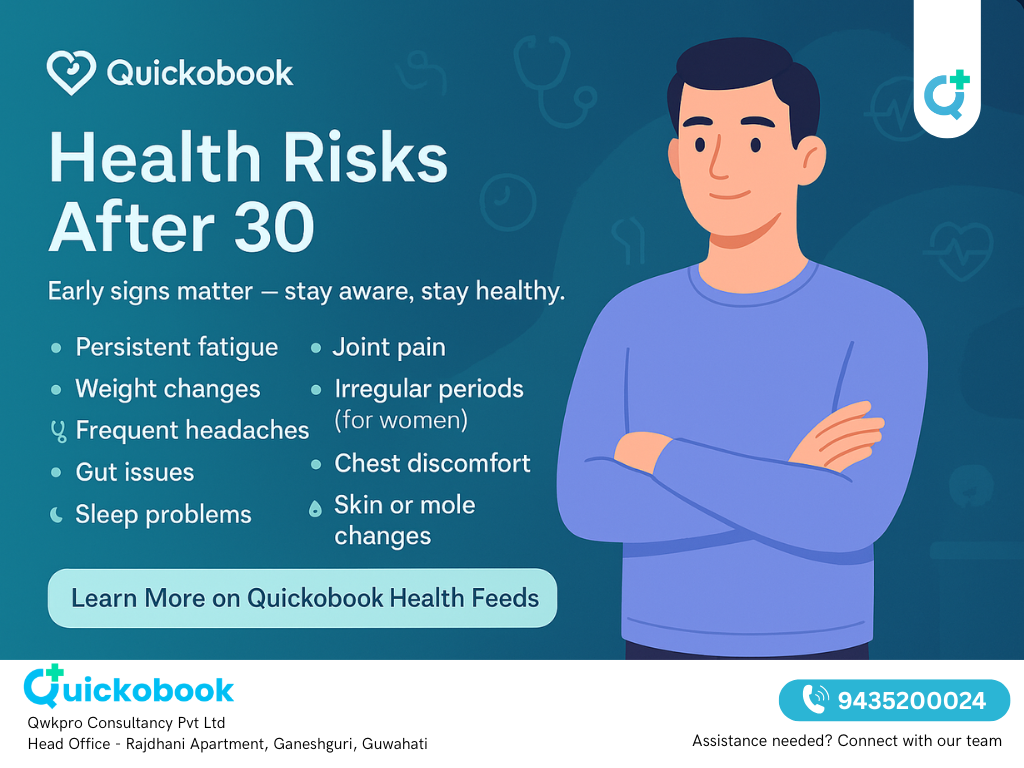








Comments (0)
No comments yet. Be the first to share your thoughts!
Leave a Comment